Some years ago, while watching Adalat, I was struck by the interesting way in which the song Jaa jaa re jaa saajna was composed (by Madan Mohan). It begins as a plaintive, melancholic song, the singer (Nargis, lip-syncing to Lata Mangeshkar’s voice) filling her song with the emotion she feels at being betrayed. Then, just as one had settled into thinking that this was a particular type of song, the tone of the song changed. The tempo increased, and though the lyrics still conveyed the same emotion, the singer (Asha Bhonsle) made them so teasing and flirtatious that their import changed. Two songs, one slow and anguished, one fast and vibrant, but woven together into one song.
What an impressive performance, I thought: and it occurred to me that there were other songs, too, of this type, where a composer and a lyricist create two songs but weave them together. Note that I’m not talking of the back-to-back songs, like Kya se kya ho gaya/Mose chhal kiye jaaye. I mean songs where the two styles of the song alternate. Also note that I regard two tempos of the same tune as two different styles.
Without further ado, therefore, on to the songs. As always, these are all from pre-1970s Hindi films (barring one, which is on the cusp) that I’ve watched. The songs are in no particular order, though, of course, the song that inspired this post comes at the top.
1. Jaa jaa re jaa saajna (Adalat, 1958): All I wanted to say about this song, I have already said in the introductory paragraph to this post—but I will add a bit of admiration here for the fine way in which a song is changed merely by the increase in the tempo of it, and the tone of the singer. It goes to show how deeply emotion influences a song: the same words, the same tune, but a completely different feel to it.
2. Jaaoon main kahaan (Miss India, 1957): Also from a Nargis-Pradeep Kumar-Pran film comes another song of this type, but a step ahead of Jaa jaa re jaa saajna. Jaaoon main kahaan doesn’t just have the tempo speeding up or the tone of the song changing from one stanza to another: the entire song changes. Nargis, as the wife who’s been abandoned by her fraudulent bridegroom on her wedding night, wanders mournfully through Bombay, trying to find her feet in a strange city, singing of her despair. Meanwhile, at a club in the city, her husband paints the town red with a girlfriend, dancing and singing of the intoxication and beauty of the night, of a life that’s full of joy and contentment. SD Burman, always vastly versatile, shows his skill here at composing very different tunes.
3. Main natkhat ek kali (Do Behnen, 1959): This isn’t a song I like a lot (though Do Behnen is one of my favourite Shyama films, and has a lovely two-version song, Saiyyaan pyaara hai apna milan). But this fits the theme pretty well. Shyama here is in a double role, acting as two sisters (oddly enough, they’re not supposed to be twins): Vasanti and Malti. The two women are like chalk and cheese: Vasanti is the typical Indian girl, sweet and gentle and bhajan-singing; Malti is Westernized, peppy, bold. Their interwoven songs, then, couldn’t be more different. Lata, singing for both avatars of Shyama, is teasingly fast-paced when she sings for Malti, slow and devotional for Vasanti.
While Vasanti’s sections are rather more in keeping with music director Vasant Desai’s usual style, the Malti sections are a revelation: how much more versatile Desai was than he’s usually given credit for.
4. Nain dwaare se mann mein woh aake (Saawan, 1959): Bharat Bhushan, I had thought, hadn’t done any double roles—until I chanced upon this film, where he plays separated-in-childhood twins. One twin grows up a bandit; the other grows up a sweet, somewhat naïve soul who plays the flute, romances the zamindar’s niece, and generally whiles away his time. Saawan had some wonderful songs (composed by the highly underrated Hansraj Bahl), and this one—or these two—is/are my favourite. Bharat Bhushan’s song is low, slow, stirring (and Mukesh’s voice fits him so well); Ameeta’s is effervescent, swift-paced, very different. This is also one of the few songs of this type where, in the end, the two songs segue: Ameeta’s character too begins to sing her lover’s song by the time she meets him.
5. Aaj ki raat, aaj ki raat (Kavi Kalidas, 1959): From another Bharat Bhushan film comes this song, which—rather like Jaa jaa re jaa saajna—consists of the same base tune and similar lyrics being sung at two different tempos, by two different characters. SN Tripathi composed the music for Kavi Kalidas, a period film that was very suited to his style of music, and to which he was able to do full justice. Here, Anita Guha acts the part of Kalidas’s childhood sweetheart Pushpavalli, pining for him; her song, in a fast and light-hearted avatar, is also sung by Kalidas’s bride, the haughty and erudite princess Vidyottama, who is looking forward to her suhaag raat. A lovely song, and the two different tempos make it all the more alluring.
6. Jab naam-e-mohabbat leke kisi (Kaala Paani, 1958): SD Burman’s excellent score for Kaala Paani is generally remembered for gems like Hum bekhudi mein tumko pukaare chale gaye or the playfully romantic Achha ji main haari chalo maan jaao or the classic mujra, Najar laagi raja tore bangle par. But the film also had this oft-ignored example of two songs in one—and they are very unlike each other. Nalini Jaywant is the heartbroken tawaif, bitter and betrayed, who sits in her kotha and sings of her pain, accompanied by the most basic of musical instruments. Then, in a complete about-turn, there is Heera Sawant, bouncy and bright and flirtatious, singing of a carefree existence: of living for the day, not giving a damn, and not holding on to hurt. Majrooh Sultanpuri’s lyrics switch as skillfully as SDB’s music, and Asha is superb in two very different styles.
7. Main hoon jahaan tu bhi wahin hai (Ek Din Aadhi Raat, 1971): Though this film released in 1971, there’s a late 60s feel about it (accentuated, of course, by the fact that it’s in black and white), which is why I’ve taken the liberty of including this song. And another liberty, because unlike most of the songs in this list, Main hoon jahaan tu bhi wahin hai, though it starts off as two distinct ‘halves’, ends up seguing into one composite whole. Sujit Kumar’s character here is married to Kumkum’s character and she begins to suspect him of not just adultery but of trying to murder her. In this dream sequence, she imagines him being lured away by the seductive Aruna Irani (singing a sultry and rather Westernized number) while Kumkum’s character, clad in traditional Bhartiya naari style, singing in a semi-classical style, tries to bring him back to her. Not for long; after a stanza or two, she changes her tune and starts singing the same lyrics to the same tune as her rival. Dattaram Wadkar composed the music for Ek Din Aadhi Raat, and though it’s not a well-known film, I like this song, sung (for both actresses) by Suman Kalyanpur.
8. Aapko jo dekhega pyaar hi se dekhega (Baadal, 1966): Usha Khanna composed this interesting two-songs-in-one duet for Asha Bhonsle and Bhupinder in Baadal. Sanjeev Kumar, as the eponymous Baadal, is a somewhat Robin Hood-like character, going about stealing from the rich to give to the poor, cocking a snook at the powerful, and generally making a nuisance of himself for all the baddies. Here, though, he gets to relax a bit and sing at a tavern where an old pal of his (Helen) is the dancer/singer. Bhupinder’s voice, lingering and gentle, is beautifully seductive: I can well imagine a woman being beguiled into thinking this man really is in love with her (which is what happens to Helen’s character here, who doesn’t realize Baadal regards her only as a friend, not a lover).
9. Zindagi badli mohabbat ka mazaa aane laga (Anhonee, 1952): The ‘two songs’ here are not quite as obvious as in the other songs on this list. Nargis plays a double role in Anhonee, as the ‘good’ girl, and as her ‘bad’ half-sister. This song begins with the ‘bad’ girl (playback sung by Rajkumari) gloating over the love that has come her way (through foul means, not fair). The song then moves to the good girl (lip-syncing to the voice of Lata Mangeshkar) bemoaning her lost love, the misery it has left her in. I like the way the lyrics (by Nakhshab Jaaravchi) merge together, each stanza leading into the next or into the refrain. Roshan’s music, slightly different for the two singers, is lovely too.
10. My my my my dear (Nagina, 1951): There are several songs (Aana meri jaan Sunday ke Sunday, Jodi hamaari jamega kaise jaani, etc) which focus on a couple of differing (East-West) backgrounds. Both Aana meri jaan Sunday ke Sunday and Jodi hamaari have the man as Westernized, the woman as a traditional Indian miss. In this song, featuring Mohana as an Anglo-Indian girl and Gope as her very orthodox ‘Panditji’ admirer, the tables are turned. It’s a love song, still, but the lyrics are very different, as is the music. Mohana’s part of it, especially, so peppy and out-and-out rock-n-roll, is quite unusual for Hindi cinema back then. Some very versatile composition there by Shankar-Jaikishan.
Do you know of any other songs which fit this theme? Please share!


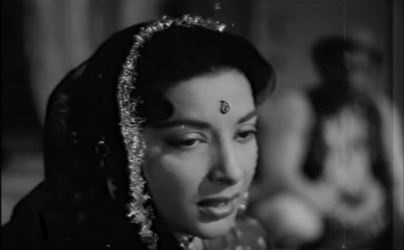
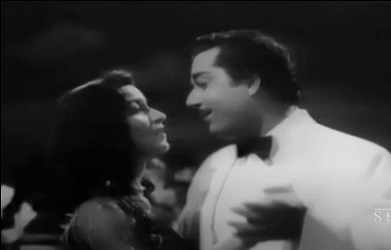
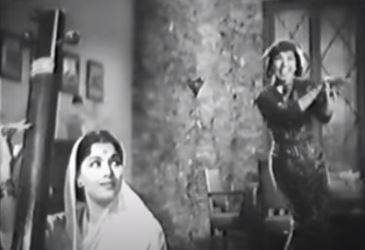
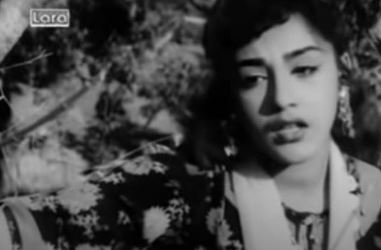

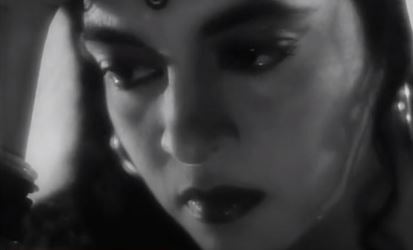
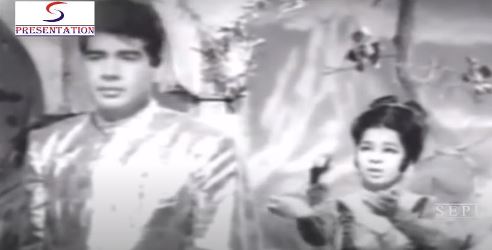
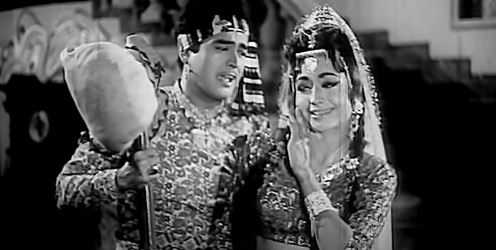
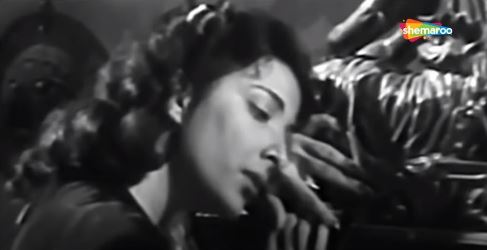
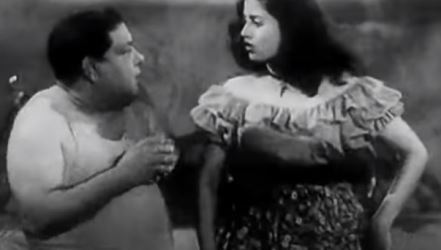
Mud mud ke na dekh is an obvious one …
LikeLiked by 1 person
How did I forget that one! Wonderful song, and it changes its tone completely.
LikeLike
There couldn’t be a better way to bud adieu to 2022 and welcome 2023. The theme is unique and the selection is curious. Hearty compliments for this wonderful post. Now I will listen to all these songs and enjoy this characteristic of them.
LikeLiked by 1 person
Thank you so much, Jitendraji. Very best wishes for this year to you and your family.
LikeLiked by 1 person
Here’s a song very dear to me which fits the bill for this theme.
LikeLiked by 1 person
I had forgotten that Khushiyaan hi khushiyaan hon had this dual nature. Thank you for this!
LikeLiked by 1 person
An interesting post on New Year’s eve, with some nice songs.
Would Aaj na chhodenge bas humjoli from Kati Patang (1970) fit?
And these?
Yun na sharma phaila de – Parwana 1971
Meri nazar hai tujhpe – The Burning Train 1980
LikeLiked by 1 person
Oh, very nice! I especially like Yoon na sharma phailade – it’s been a long time since I heard that song. Lovely.
LikeLike
Happy new year to you in advance Madhuji!
And it’s a coincidence again that I’ve just shortlisted songs for a list that sounds similar to yours, but this time there would be overlapping songs to some extent. I’m publishing it next month.
Yours is a beautiful list.
Reminded me of my old list of songs with two different moods in the same song. Many of the songs overlapped. However, your list won’t have, Kaisi haseen aaj baharon ki raat hai, as there is no significant change in tempo. But it was there on my list.
Would these qualify?
Lata and asha’s first duet
Yeh ruki ruki hawayen
Patali kamar hai
Betab hai dil from Dard
:-)
LikeLiked by 1 person
Oh, great songs, Anupji! I’d forgotten these ones, even though I’ve seen both Dard as well as Barsaat, so I should’ve remembered those.
I remember your post about different moods in the same song – and that some of these songs were there too. I’m looking forward to the other post you’ll be putting up later this month.
LikeLike
Dear Madhu ji,
As you can see, I am back on board and thank you for that. This one had me racking my brains for “2 songs in one” and it’s not easy.
I wonder if this will fill the bill
(Jai jagadish hare….)
[ this one is an example of Counter Melody, which noted Italian Composer FRANCISCO CASANOVAS had taught to a young Hemant Kumar in Calcutta way back in the ’40s. It is worthy of note that this same Mr. Casanovas had interacted with Kabiguru Tagore in Shantiniketan and the National Anthem that you hear today is based on the harmonisation developed by him. Yet again, after relocating to Bombay from Calcutta in 1952, Francisco taught the rudiments of Western Classical Music to a teenaged Zubin Mehta and it was on his recommendation that Zubin’s Dad MEHLI sent a young Zubin to Vienna, but only after completing his secondary education. Francisco left India in 1956 after spending nearly 30 years in the Country! ]
And surely, this one must be an outlier
(Tu pyar kare ya thukraye….)
[ the changes come at the very end ]
Then there is this one , but Post 1970 , a very long song!
Good to be back! A Very Happy New Year to you Madhu ji and your Family.
With warm regards
PARTHA CHANDA
LikeLike
I’m so glad you’re back, Parthaji! And with such beautiful songs too.
Though I have seen Anandmath, I had completely forgotten about Jai Jagdish Hare – what an amazing song. Thank you, too, for the background to that.
I’m not sure Tu pyaar kare ya thukraaye would be an example of this style of song – probably closer to the twin songs from Guide, where one song follows the other. In Dekh Kabira Roya, three songs follow after each other: Meri veena tum bin roye is the first one, Ashqon se teri humne is the second, and Tu pyaar kare ya thukraaye is the third. They segue into each other, but are each complete songs in themselves.
The medley of Hum Kisi Se Kam Nahin is really enjoyable. There were a couple of other medleys picturised on Rishi Kapoor too, if I remember correctly…
LikeLiked by 1 person
What a lovely theme, Madhu. Coincidentally, I have just finished subbing Anhonee for Tom and had noted the difference in the Lata-Rajkumari duet, though I didn’t think of it as a theme for a post. The songs that came to mind when I read your description were the songs from Kala Pani, Nau Do Gyarah, – unfortunately, I can’t think of any song that fits the theme now though I know there are a couple hidden in the recesses of my memory. Will return to post them if I remember…
LikeLiked by 1 person
I do hope you remember them! There are several fairly popular songs which have been posted by other people, and they made me wonder why I hadn’t thought of those particular songs on my own. :-)
LikeLike
Madhuji, I remember you commenting on my post on Consecutive melodies saying that you intended to write something similar. But I must say, this post has a completely different complexion.
I came across this rather obscure song from the movie Jyoti Bane Jwaala, which is actually a stage performance – probably depicting the Vishwamitra- Menaka episode. It begins as a classical song sung by Sarika but seeing the reaction of the audience, Vinod Mehra (playing the sage) jumps and sings the same words to the tune of Chal Chal Chal Mere Haathi. It is rather hilarious.
Also would a qawwali qualify in which case Allah Yeh Adaa Kaisi Hain in Hasinon Mein from Mere Humdum Mere Dost has an altering pace.
and finally the song from China Town Yamma Yamma Yamma, where Shammi Kapoor sings Ya Dilruba (a copied tune of a song from Bewaqoof)and changes the tune and tempo.
LikeLiked by 1 person
Thank you, Anitaji, for commenting, and for suggesting these songs. I knew the other two songs (though I’d forgotten that they had this ‘dual song’ character), but Tu jogi main jogan was new to me. I guess I probably heard it sometime (the film used to be very popular when I was a child, and its songs were ubiquitous), but it had completely slipped my mind.
LikeLike
Happy New Year, Madhu! What an interesting theme to start off the year. Nain dwar se is my favorite of this type of song, but here are two more songs that I like and that I think fit the bill.
Sapnon mein mere koi jaye – Poonam Ki Raat/Salil Chowdhury/Mukesh-Lata & Usha Mangeshkar/Shailendra
Kya ho jo phir din rangeela ho – Nau Do Gyarah/S.D. Burman/Geeta Dutt-Asha Bhosle/Majrooh Sultanpuri
LikeLiked by 1 person
And Happy New Year to you, Shalini! Thank you for these songs – both are good, but I have a special fondness for Kya ho phir jo din rangeela ho. God knows why this one didn’t occur to me when I was making this list. :-(
LikeLike
What an interesting theme! I could only think of mudh mudh ke na dekh but someone has already mentioned it. I remember another similar post on same song sung at two different times in a movie with very different tones. I don’t think current song writers and music composers have the same flair- same words, different moods, different tempo, completely different emotions, songs suddenly changing mood half way.
LikeLiked by 1 person
I’m glad you enjoyed this, Simrita! Thank you.
And yes, I agree with you about song writers and composers today lacking that flair – I think the preponderance of electronic music, and of all the conveniences that flood out lives, perhaps blunt creativity…? I don’t know.
LikeLike
Could be; there is a lot more focus on all that is available to elevate music to dhinchak dhinchak levels, and nothing else. And even less attention to words! Language feels butchered :-(
LikeLike
Very interesting idea!! Not easy to find songs for this. I thought of this song but I am not sure whether it qualifies. I love this song.
Chal kahin door nikal jaayein from Doosra Aadmin
LikeLiked by 1 person
Oh yes, this is a lovely song, Usha. Thank you for this!
LikeLike
Madhu, I was just working on a post and was listening to Dekhi zamaane ki yaari – wouldn’t that fit your theme? Ud jaa ud jaa pyaase bhanwre is so different in mood and melody from the rest of the song.
LikeLiked by 1 person
That’s an interesting suggestion, Anu. But that Ud jaa ud jaa pyaase bhanwre is (to me) a much shorter piece than a full-fledged ‘song’, so I wouldn’t count it here. But what a fantastic composition. And lyrics. And rendition.
LikeLike
That is an interesting theme and I’m intrigued by couple of these films , saawan
and ek din aadhi raat.
Few examples which came to mind
1.Ik Raasta Hai Zindagi – Kaala Patthar (1979)
2. Aag Se Aag Bujha Le – Jalte Badan (1973)
3. Inteha ho gayi intezaar ki – Sharaabi (1984)
I think the dance offs between Vyjayanthimala and Helen from Dr.Vidya (Aye Hai Dilruba Tujhko Kya Pata) and Prince (Muqabla Hum Se Na Karo) might also fit this theme.
LikeLiked by 1 person
Thank you for these delightful suggestions! I especially like that you’ve suggested Inteha ho gayi and Ik raasta hai zindagi – both are, to me, excellent examples of this style of song. I agree too that the two dance-offs you suggest are in this style.
LikeLike
Ooh, and I just remembered this one: Ab yaad na kar ae dil from Anokha Pyar.
Dilip K begins by being heartbroken and cynical and exhorting his heart to forget his love, not to remember the past, etc. Then, Nargis shows up, and not having seen/heard his sad song, tells the breezes how much she loves him and yearns for him, and then he becomes all happy and exultant. Quickest change of heart, I must say! Even the tempo changes… (his memory returns as well.)
LikeLiked by 1 person
Oh this reminds me of Inteha ho gayi, intezaar ki. Same to same, Amitabh Bachan is all sad & weepy and then Jaya Pradha come and he starts playing the bongo. And everything is well in the world and everyone is happy. “Dekha tujhe toh dilon mein jaan aa gayi…chaa gayi phir wohi bekhudi”. Really love that song, hate the movie. Does it count, I wonder?
LikeLiked by 1 person
:) Ha! Yes! Same to same, is right, Simrita! But I do love the [cheesy] bit of poetry in the middle where they talk about the different kinds of ‘nasha’ in the world.
Love the song, cheesy as it is, hate the movie is the perfect way to describe it. That movie cemented a die-hard AB fan’s dismay at her favourite hero’s trajectory. :(
LikeLiked by 1 person
This was the stage where all AB movies were only about him- I can take in ham acting- I have very high tolerance for it (for instance, I love SRK, too, with all his idiosyncrasies)- but when it’s just one character moaning, groaning, hamming, being silly, and there is no story, it just gets too much.
I had to go listen to the song again (always willing to drop work and go listen to hindi songs!), and the only nasha line comes towards the end,
‘Yeh nasha yeh khushi ab na kam ho kabhi’
This cannot be the line you are talking about? I am not sure which part you are referencing to.
(Oh look where the conversation has gone to – from Madhu’s theme to AB & lyrics from his song! Sorry for hijacking you post!)
LikeLiked by 1 person
I am more than happy to have people like you and Anu hijack a post. :-) You’re both intelligent, you have interesting insights to offer, and you are civilized. A joy to read, even on tangents.
LikeLike
Oops! Sorry, I got it mixed up with Mujhe naulakha mange de re – that’s the one that has all the nasha.
I so agree with you about the moaning, groaning, hamming – all of which I can take in small doses if there’s a great story to back it up. But, man! The AB of those days had become such a caricature it broke my heart. I was never so glad as when he took that enforced sabbatical. He was better off when he returned and did movies like Khakee, Aks and Aankhein!
(Apologies to Madhu, indeed! :) )
LikeLiked by 1 person
Arre, no need to apologise! :-) I am enjoying this conversation from the sidelines, even if I’m not much of an AB fan.
LikeLike
Ah, then I *had* to go listen to this song even though I don’t like it! You are right, the sabbatical helped, it felt like it humbled him and even though he continued to ham his way through, the movies were much bigger than AB and it kind of put him in place. Though I don’t like the current AB on KBC- I find him too annoying.
Come to think of it, the only AB I ever gave my heart to was the the Chupke Chupke one, the one with the sliding glasses, the one who confused corolla and karela. Oh and the Anand wala AB.
LikeLike
Oh and Happy Birthday, Madhu! I saw many people wish you! Though I should not be surprised that you are January born- I have an uncanny tendency to drift towards Jan born people. Hope you had a great one!
LikeLiked by 1 person
Thank you so much, Simrita! And yes, I had a wonderful birthday. :-) Was travelling, which is my favourite way of celebrating. :-)
LikeLike
Ooh, interesting. This is a film I’ve never got around to watching (mostly because of an – admittedly biased and ignorant – idea that most early DK films were pretty depressing). But this was interesting. And Nargis is so pretty here. :-)
LikeLike
How about this song ?
Bhor aayi gaya andhiyara from Bawarchi
LikeLiked by 1 person
Oh, nice! This is a good song, and such a likeable film too.
LikeLike
Another interesting theme, Madhu, and good choices as always. I guess I am a little late to comment this time… I didn’t know about this post. I went to your blog wondering if you had ever gotten back to making special posts for your birthday. (I hope you are not trying to keep that a secret now! And hope you’ve had a good one.)
Anyway, back to the theme of this post… The first song that came to my mind is one from across the border, in Pakistan. I know it’s cheating a little, but this one’s really interesting because not only does it depict two different characters and moods (though without such a big change in tempo); it also is sung in two different languages – which, so I have read, are both pronounced perfectly.
LikeLiked by 1 person
Thank you, Richard – also for remembering my birthday! I’m flattered. I haven’t actively begun to hide my birthday, just taken it off Facebook and not talking much about it, because the deluge of wishes was getting a bit overwhelming – I would spend my entire day replying to people (most of whom are complete strangers, not even online ‘friends’), and it stressed me out a good deal.
Thank you for this song. I’ve heard of Patay Khan, but never seen it, nor heard this song. Yes, both the Punjabi and the Urdu sections of Do raahi rasta bhool gaye are very well sung (not surprisingly; even Mohammad Rafi and Shamshad Begum, thanks to their Punjabi origins, sang equally well in both languages). A unique song, I think – I have never come across another of this type, that straddled not just tones but languages too.
LikeLike
Dear Madhu,
First off, belated greetings for your birthday. Hope it was a fun-day!
And apologies for writing in so late in response to the theme.
As always, am in awe of your selection of yet another unusual theme!
As also with the myriad songs posted in response
and still coming in,…..
Here is one that I believe is in consonance with your theme.
To quote you:
“I mean songs where the two styles of the song alternate. Also note that I regard two tempos of the same tune as two different styles”
——————————————————-
The song:
“Aaj Se Pehle Aaj Se Zyada”
Film : “Chitchor” (1976)
Directed by Basu Chatterjee
Music and Lyrics by Ravindra Jain
Sung by K.J. Yesudas
Featuring Amol Palekar, Zarina Wahab, Vijayandra Ghatge, Master Raju
———————————————————————————————–
LINKS:
As posted by RAJSHRI (producers of the film “Chitchor (1976)
(4:34 mins)
(1:22 mins)
————————————————————————————-
IMP. NOTE:
The LINK given here BELOW, is to
The “composite ” song:
“Aaj Se Pehle Aaj se Zyada”
with the sad part following the happy song (at about 4:30 mins)
But this is NOT the original video posted by RAJSHRI
(on the website)
And most likely, a “dupe”, as is apparent from the visual quality .
I am giving this LINK, all the same.
Please do let me know if the LINKS do open!
Esp. the ones given earlier.
(Clarity of both video and audio assured,
as they are from the official web-site of RAJSHRI)
——————————————————————————
LINK to the “composite” song:
best wishes,
Praba Mahajan
LikeLiked by 1 person
Dear Praba, thank you so much – for the birthday wishes, and for this lovely song. I like Aaj se pehle a lot, though I’d forgotten that it had this dual-mood characteristic. Thank you for posting this!
LikeLike
This song is a very nice example of using the same tune and almost the same tempo to cater to two very different moods separated by 5-10 mins of screen time. In the first, Amol is all happy and gushing, looking forward to his marriage which is due in a month and a half. Zarina in turn is quiet, as she has been asked to marry Vijayendra, obviously against her will. At the same time, she knows that Amol does not know of her predicament. During the picnic, Amol is heartbroken as the truth is revealed by Vijyaendra. The lyrics and the expressions change accordingly during the return journey. Very nicely done by Basu Chatterji and his team.
P.S: Some shameless self-publicity. My book “Basu Chatterji: And middle of the road cinema” is due in March. Published by Penguin, it is more about behind the scene stories than analysis.
LikeLiked by 1 person
Congratulations on the upcoming book, Anirudha!
LikeLike
I am struggling a bit to wrap my mind around this theme. I think I need to do more thinking (/listening) regarding the formal structures of filmi songs before returning to it. How musically distinct does a segment of a song need to be to count as “two in one” as opposed to merely an additional antara? But such are the internal struggles of a musicologist who enjoys desi music without knowing very much about it ( ;
I considered and rejected many, many different possibilities for this theme before landing on “Zulf Hai Dosh Pe” from “Baarish,” to which I was recently introduced via Anup’s blog:
Unlike, e.g., the similarly macaronic song from “Teen Batti, Char Raasta,” I felt pretty confident calling this one a single song in multiple styles rather than a series of songs that occur within the same scene.
LikeLiked by 1 person
I have watched Baarish before, but I’d forgotten how this song switches styles and music. Very nice! Thank you for this.
LikeLike
Oh, and: I’ll be excited to turn to your “Nagina” writeup momentarily, since I have enjoyed that rockabilly style song for years without knowing anything about the movie it came from! Anon.
LikeLiked by 1 person
That song is such a delight, isn’t it? Richard Singer reminded me of it some months back, when he posted it on one of my song lists. Just out of curiosity, I went looking for Nagina then, and found it. Now I wish I hadn’t.
LikeLike
What a unique theme to kick off 2023, and what a collection of songs!
LikeLiked by 1 person
Thank you so much. I’m glad you enjoyed this!
LikeLiked by 1 person
I believe the song below fits the theme:
LikeLiked by 1 person
I did think of Aaye haaye dilruba, but it was a little borderline for me – I didn’t think the two versions of the song differed too much. But then, that’s my opinion only.
LikeLike
Would Gham ki andheri raat mein fit this theme? The verses alternate between hope and despair. From Sushila (1966)
LikeLike
What a lovely song this is. It’s been ages since I heard it. Actually, I think this should probably join another group of songs, where the tune doesn’t change, but the emotion does. This particular list is for songs where the tune/tempo/etc changes, not necessarily the emotion. I think there are quite a lot of songs where the tune remains standard but the emotion changes – all those roothna-manana songs, for instance.
LikeLike